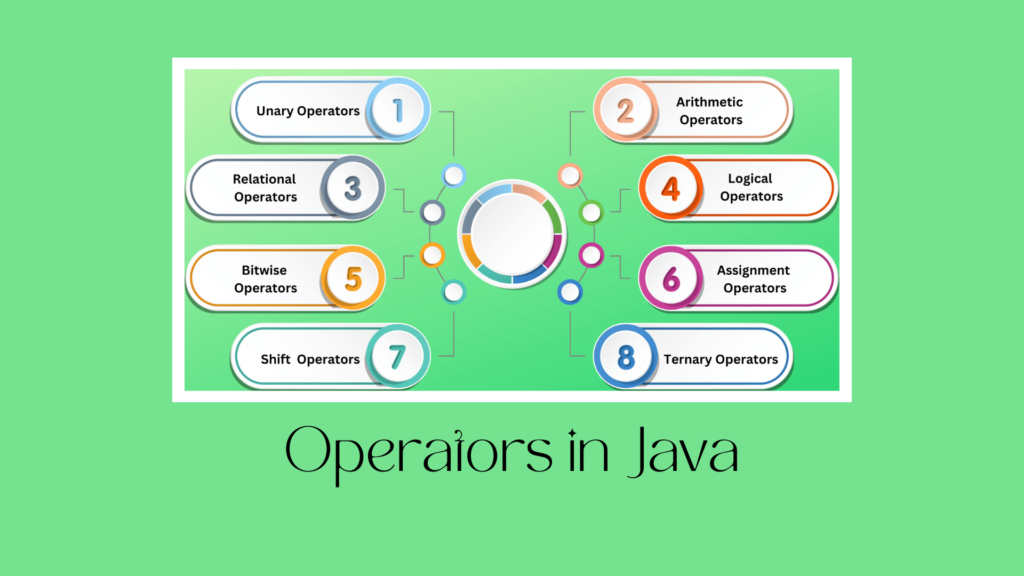I. Introduction to Operators in Java
Operators in java are essential components in programming languages. They serve as the building blocks of various operations and calculations. In Java, operators are crucial for performing tasks such as arithmetic operations, comparison of values, logical evaluations, and bit manipulations. By understanding and mastering operators, Java developers can write efficient and powerful code.
Contents of Operators in Java
II. Arithmetic Operators
Arithmetic operators in Java allow for basic mathematical operations. These operators include addition (+), subtraction (-), multiplication (*), and division (/). Understanding the order of execution and precedence is crucial to accurately perform calculations involving multiple operators. Java also provides the modulus operator (%) which calculates the remainder of a division operation. Additionally, the increment (++) and decrement (–) operators are used to increase or decrease values by one. It is important to comprehend operator precedence and associativity to ensure correct execution of mathematical expressions involving multiple operators.
III. Relational Operators
Relational operators in Java are used to compare values and determine relationships between values. Equality and inequality operators, represented by == and != respectively, allow for the comparison of equality or inequality between two operands. Comparison operators such as <, >, <=, and >= enable the evaluation of greater than, less than, greater than or equal, and less than or equal relationships respectively. Relational operators return boolean results, which are commonly used in conditional statements to determine the flow of the program. Furthermore, these operators can also be used for string comparisons, providing flexibility for string handling in Java.
IV. Logical Operators
Logical operators in Java are fundamental in decision-making and logical evaluations. The logical (&&) AND operator returns true only if both operands are true. Similarly, the logical OR operator (||) returns true if at least one of the operands is true. The logical (!) NOT operator negates the value of its operand. These operators are commonly used to combine multiple conditions and control program flow based on the outcomes. Java’s logical operators also support short-circuit evaluation, which allows for efficient execution by evaluating operands only when necessary.
V. Bitwise Operators
Bitwise operators in Java manipulate individual bits within binary representations of data. These operators include bitwise (&) AND, bitwise (|) OR, bitwise (^) XOR, and bitwise (~) NOT. They are useful in low-level programming, dealing with hardware interactions, and efficient data manipulation. Understanding the bitwise operators and their practical applications are essential for programmers working on tasks that involve bit-level calculations or data compression techniques.
VI. Assignment Operators
Assignment operators in Java are used to assign values to variables. The basic assignment operator (=) assigns the value on the right-hand side to the variable on the left-hand side. In addition to the basic operator, Java provides compound assignment operators such as +=, -=, *=, /=, and %= which combine arithmetic operations and assignment in a concise manner. These shortcut operators enhance code readability and reduce the need for repetitive code blocks when performing multiple calculations on the same variable.
VII. Conditional Operator (Ternary Operator)
The conditional operator (also known as the ternary operator) in Java provides a concise alternative to if-else statements. Its syntax is in the form of condition ? expression1 : expression2. The condition is evaluated, and if it is true, expression1 is executed; otherwise, expression2 is executed. Proper usage of the conditional operator can result in more concise and readable code, especially when dealing with simple conditional assignments or calculations.
VIII. Instanceof Operator
In Java, instanceof operator is used to check the type of an object at runtime. It returns true if the given object is an instance of the specified type or any of its subclasses. This operator is particularly useful when working with polymorphism and class hierarchies. It helps ensure type compatibility, enabling developers to effectively handle type conversions and implement appropriate logic based on the object’s actual type.
IX. Bit Shift Operators
Bit shift operators in Java are used to shift the bits of a value either to the left or to the right. The left shift operator (<<) moves the bits to the left, effectively multiplying the value by 2 for each shift. The right shift operator (>>) moves the bits to the right, effectively dividing the value by 2 for each shift. Java also provides the logical right shift operator (>>>), which fills the leftmost bits with zeroes. Bit shifting is commonly used in tasks involving binary data manipulation, creating efficient algorithms, and implementing encryption techniques.

X. Operator Precedence and Associativity
In Java, operator precedence and associativity determine the order in which operators are evaluated. It is crucial to understand these concepts to avoid unexpected behaviors and to write code that accurately reflects the intended logic. Java follows specific rules for operator precedence and associativity, which developers should be familiar with. Additionally, having a quick-reference table of operator precedence can be immensely helpful during code development and debugging processes.
XI. Operator Overloading
Operator overloading is a feature in some programming languages that allows operators to behave differently based on the types of operands. However, this feature is not supported in Java. Unlike languages such as C++, Java does not allow developers to define new meanings for operators or extend their behavior beyond their predefined functionality. This constraint encourages developers to rely on established conventions and alternative design patterns for achieving the desired functionality.
XII. Operator Conventions and Best Practices
Adhering to established conventions and best practices in writing Java code helps improve readability and maintainability. When using operators, it is essential to follow established conventions such as proper indentation, consistent spacing, and the use of parentheses to clarify the order of operations. Code should be written in a way that promotes clarity and avoids unnecessary complexity or side effects. By maintaining a consistent and readable coding style, collaboration and further development become easier tasks.
XIII. Common Operator Pitfalls and Errors
Working with operators in Java can sometimes lead to pitfalls and errors if not handled carefully. Understanding and anticipating common mistakes can help developers avoid these issues. Some common pitfalls include operator precedence mistakes, incorrectly using logical operators, or misunderstanding the behavior of specific operators. When encountering operator-related errors, developers should leverage debugging techniques and use error handling strategies to identify and resolve issues effectively.
XIV: Performance Considerations and Optimizations
The choice of operators in Java can have performance implications. Understanding the performance characteristics of different operators is vital for writing efficient code. By analyzing how specific operators interact with the underlying hardware and optimizing code accordingly, developers can significantly improve program performance. However, it is crucial to strike a balance between code readability and performance trade-offs. Careful consideration should be given to optimizing critical sections of the code while maintaining overall code quality.
XV. Advanced Operator Techniques
As developers gain mastery over operators, they can explore advanced techniques that combine operators intelligently to perform complex operations. By creatively leveraging bitwise operators, for example, developers can achieve specific needs such as implementing custom data structures, optimizing memory usage, and creating efficient algorithms. Advanced examples showcasing the versatility of operators provide valuable insights into harnessing the full potential of operators in Java.
XVI. Summary and Key Takeaways
In summary, operators are fundamental building blocks in Java programming. They serve various purposes, including arithmetic calculations, comparison of values, logical evaluations, and bit manipulations. Understanding and mastering operators is crucial for efficient development and accurate execution of code. By applying the knowledge gained from this comprehensive guide, developers can confidently work with operators and leverage their power for writing high-quality Java code.
XVII: FAQs
- What are operators in Java?
- Operators in Java are symbols that represent actions or computations. They can perform functions such as arithmetic calculations, value comparisons, logical evaluations, and bit manipulations.
- How many varieties of operators are there in Java?
- Java has various types of operators, including arithmetic operators, relational operators, logical operators, bitwise operators, assignment operators, the conditional operator, the instanceof operator, and the bit shift operators.
- How are operators prioritized in Java?
- Operators in Java have different levels of precedence, which determine the order in which they are evaluated. Parentheses can be used to override the default precedence and control the order of execution.
- Can operators in java be overloaded?
- No, you cannot overload operators in Java. Unlike some programming languages, Java does not allow developers to redefine the behavior of operators or create new operator meanings.
- What are the most common pitfalls when using operators in Java?
- Common pitfalls when using operators in Java include incorrect operator precedence, misuse of logical operators, and misunderstanding specific operator behaviors. These issues can be avoided through careful understanding and following established best practices.
XVIII. Conclusion
Operators play a vital role in Java programming, serving as the fundamental building blocks for various operations and calculations. Through this comprehensive guide, readers have gained insights into different types of operators, their functionalities, and best practices for utilizing them effectively. Mastering operators empowers Java developers to write efficient and powerful code, paving the way for efficient development and successful software projects. It is essential to continue exploring operators, experimenting with different techniques, and practicing their usage to continually enhance programming skills and deliver high-quality Java applications.



